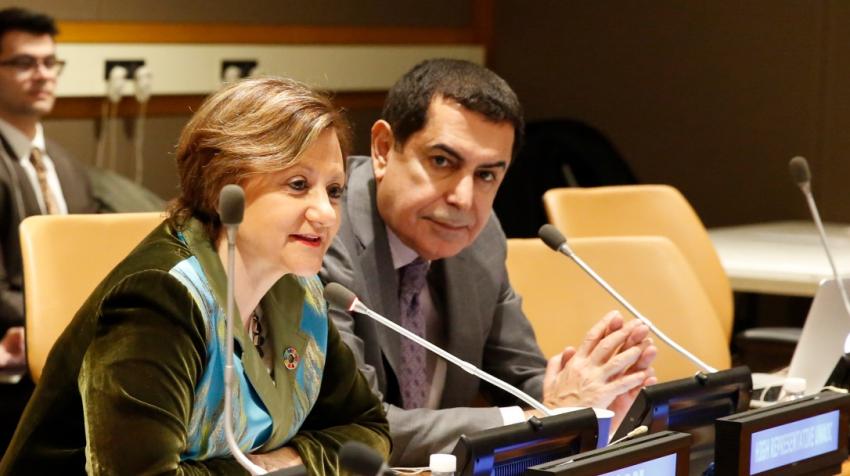Delegates and members of civil society gathered on 13 February 2017 at United Nations Headquarters in New York to discuss and provide a forum for debate on strategies and methods for the prevention of violent extremism.
The Forum, co-organised by the United Nations Alliance of Civilizations' (UNAOC) Media and Information Literacy programme and the United Nations Academic Impact's (UNAI) Unlearning Intolerance programme, carried the theme Media and Information Literacy: Educational Strategies for the Prevention of Violent Extremism.
The event was also an occasion for the presentation of the recently published Opportunities for Media and Information Literacy in the Middle East and North Africa, co-published by the United Nations Alliance of Civilizations, the United Nations Educational, Scientific and Cultural Organization, and the Nordic Documentation Center for Mass Communication Research (UNAOC-UNESCO-NORDICOM).
Moderated by Jordi Torrent, Project Manager, Media Literacy Initiatives, United Nations Alliance of Civilizations, this event was the first in a series of the Prevention Forum, launched within the Unlearning Intolerance programme managed by the United Nations Academic Impact.
The discussion was an opportunity to debate the concept of Media and Information Literacy (MIL), a formal and informal pedagogical practice that aims to promote the development of critical thinking skills in individuals. Rather than censoring media that is potentially harmful, MIL invests in a long-term strategy that promotes a culture of peace and understanding among individuals that protects and enriches their worldviews.
Addressing the Forum, Nassir Abdulaziz Al-Nasser, High Representative for the United Nations Alliance of Civilizations, stated that there was a need to seriously consider media literacy education as a fundamental building block for the development of more inclusive and democratic societies and that such an urgency has indeed increased.
Moreover, he expressed that the Forum was an opportunity to discuss what information, emotions, and concerns are driving thousands of young people to join ISIS and similar extremist and violent groups, and for participants to explore what was missing in the education and communities of those most affected.
Speaking at the event, Cristina Gallach, United Nations Under-Secretary-General for Communications and Public Information, stressed that the Secretary-General of the United Nations, António Guterres, has stated that prevention is at the centre of United Nations actions, and that media literacy is an instrument that can be decisive in the success of prevention policies.
She further highlighted that promoting respect and understanding would not only reduce conflict but also build more peaceful societies. The more we open ourselves to different groups, the more we will be able to curb the growth of extremism, added the Under-Secretary-General.
Ms. Gallach also suggested that we reflect on how we can counter fake news and misinformation.
The keynote speaker, Renee Hobbs, Professor of Communication Studies, University of Rhode Island, presented to participants and panel members how values are constructed through narrative, underscoring that media and information literacy advances critical thinking, reduces political polarization, and inspires civic engagement, adding that the highest result of education is tolerance.
Hahn Choonghee, Ambassador and Deputy Permanent Representative of the Republic of Korea to the United Nations, asserted that the root causes of violent extremism are at once ideological and socioeconomic, and that they are fuelled by a variety of aspects, ranging from the lack of rule of law and of democratic institutions to social exclusion and corruption.
Ambassador Choonghee reminded the participants of important past initiatives that have focused on fighting violent extremism, such as the Plan of Action to Prevent Violent Extremism; A Teacher's Guide on the Prevention of Violent Extremism, published by UNESCO; the 7th UNAOC Global Forum in Baku, Azerbaijan, held in April 2016; and the 66th UN DPI/NGO Conference, held in June 2016.
He stated, however, that there is no clear and coordinated policy or strategy to prevent or eradicate violent extremism, which he estimated to be one of the most serious and threatening phenomena today.
Other speakers included Guy Berger, Director, Freedom of Expression and Media Development, UNESCO, and Regina de Assis, former Secretary of Education, Ministry of Education, Brazil.
There were also interventions by Magda Abu-Fadil, Director, Media Unlimited, and Liam Hackett, Founder, Ditch the Label.
To view a webcast of the Prevention Forum, please click on the following link: http://ow.ly/U3I8308VIJS.
For more information on the work of the United Nations Academic Impact and the United Nations Alliance of Civilizations, please visit https://academicimpact.un.org and www.unaoc.org.

